Amber Corkin and Aubri Robinson are twin sisters who received a prompting that their daughters need to learn of women in the scriptures while growing up, more than they had as youth. They studied the scriptures and divine identity to help their children, and developed their own sense of divine identity along the way. They recently published Dear Divine Daughter: Inspiring Stories of Bible Women, a compilation of stories of women in the Bible.
Tell me about yourselves.

Amber Corkin and Aubri Robinson
AUBRI: We’re twins, and we’re thirty. I live in Minnesota and Amber lives in St. George, Utah.
AMBER: We grew up in a typical Latter-Day Saint family. We were taught the gospel, we went to church and read the scriptures. Nothing was outside of the ordinary with our gospel learning.
Fast forward to about four years ago. We were both married, we both had kids. Aubri had two daughters. I had a son and was two weeks postpartum with my daughter. One day, I was nursing her and looking down at her, and I had a strong feeling that I was holding something divine. I knew she was from heaven and that she had Heavenly Parents who loved her. Later that day, I was reading the scriptures and came across a story with a male protagonist. At that moment, I had the feeling that my daughter needed the stories of women that she could look up to and would inspire her, and that I could write them into stories that she can enjoy even while she is young. So I called Aubri, who had her own infant girl at the time.
AUBRI: We had worked together on projects and businesses before. We work well together and enjoy doing so. Twins, best friends, business partners …
AMBER: We talked about when we were growing up, we didn’t really hear the stories of women. They seemed to take a backseat to all the stories of men from the scriptures that were shared.
AUBRI: It didn’t seem like anything was lacking when we were youth, but reflecting as adults with daughters ourselves now, we recognize that there was a space that needed to be filled.
AMBER: We wanted that for our girls who we loved with all our hearts. So we decided to pursue the project of writing a book about women in the scriptures. We researched for a year or so – we read the scriptures, and we started writing out their stories.
AUBRI: It was amazing, as we were writing, to see just how many women are in the scriptures – all the stories, all the names, and even women who are nameless in the scriptures. When we started the project, we said, “I don’t know if there’s going to be very many.” We ended up including thirty-four women and each one has an inspiring story to tell.
How did you choose the thirty-four? What was your criteria to be included?
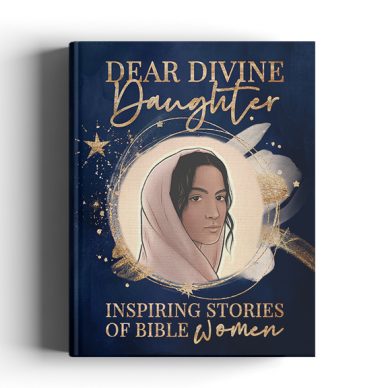
Dear Divine Daughter: Inspiring Stories of Bible Women
AMBER: We collected about fifty stories, and a few different factors played into what ended up as our thirty-four. We reached out to publishers and got feedback that we needed to shrink the size of the book. So we knew it needed some cutting, which led us to focus on Bible women specifically and only use the Bible as our reference. So that knocked out a handful, including Eve, which was a painful decision for us. We love Eve but it turns out that a lot of the inspiring amazingness about Eve comes from the other scriptures.
AUBRI: Through the lens of the Bible, Eve is unfortunately not painted in the way that we know and love her. We also wanted this book to appeal to a wider Christian audience. But there may or may not be another work coming out, and Eve is in it. We couldn’t help it – not do Eve, not give her a story.
AMBER: And we were writing a book for children so there were a few stories that we couldn’t include, because they were a little graphic. Jael didn’t make it in because she stabs a guy in the head with a tent stake. She’s awesome but the book is geared toward children and teens. We whittled it down to the thirty-four that we just couldn’t not have in there. Another criterion was, who did we want our girls reading about and becoming?
AUBRI: There is a motive when you have daughters that you’re trying to inspire and to raise well and teach important truths. And I feel that with amazing women role models, they’re much more likely to relate and feel a connection with them.
We were raised by moms who live the gospel, love the Lord, taught us the scriptures, but they didn’t focus on the women in the scriptures. But now we are very adamantly focusing on women in the scriptures for the next generation. What do you think has changed in the world, in society, in the Church, to cause this change of focus?
AUBRI: I think stories have always been a big part of how we teach and reach children. We grew up hearing stories of our ancestors, including the amazing women. Our grandmother was the first dental hygienist in Utah. Our great-great grandmother was a widow with ten children, and she went to college and got a degree in her later years. Storytelling has always been inspiring.
I think that you’re right that there has been a shift. Recently, it’s probably a cultural or generational shift, where we finally recognized that women’s voices have been not as represented in scripture and in other areas of the Church. It’s exciting to see that their voices are now being heard and it’s fun to be a part of that.
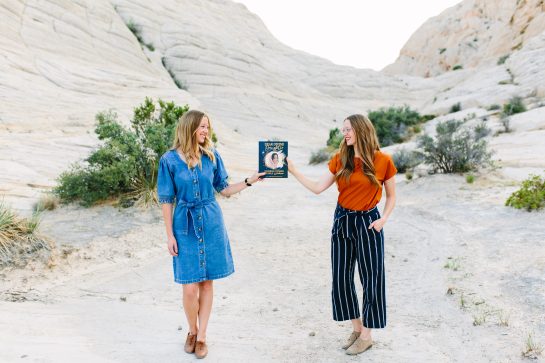
Amber Corkin and Aubri Robinson with Dear Divine Daughter
AMBER: I agree. I think there’s a shift in needing visibility of women. Our generation is starting – I’ll say starting, because I think we have a long way to go – starting to recognize how important it is for girls to see women in leadership roles, in scripture stories. We’re excited to be a part of this shift and momentum. Our mother now is catching the bug. She looks back and says, “Wow, I should have known. I wish that I had known the stories of the women and shared them with my children.” So I don’t know if it’s generational as much as a new movement.
AUBRI: In and outside of the Church, there has been a movement for women to have a voice. It’s a very good thing because women bring a lot to the table – amazing qualities and characteristics, unique and beautiful things. In the Bible, there are all different kinds of people – queens and princesses and slaves and servants. People who are strong, people who are caring, a huge variety. Hopefully, the takeaway of our book is: No matter who you are and what your innate characteristics are, you have the potential to do good and inspire others. At the back of the book, there’s a section where girls can fill in their own name, story, and picture. That is an effort to help them realize that they fit among these inspiring women, and they have the potential to do good just as the women of the Bible.
I’m grateful for personal revelation. I totally have a testimony and faith of the stories within the scriptures, even though women are not even named. It’s sad to me at times, and disappointing that women didn’t have names and weren’t as prominent in the scriptures. There had to have been a cultural thing back then that has carried through time. It’s all the more reason to learn the names of the girls around us now and within the ward – to learn their names, to be invested in them and their lives and their stories, and to empower them as best we can. One way that Amber and I can do that is through our writing, by highlighting the other amazing women that we know and love.
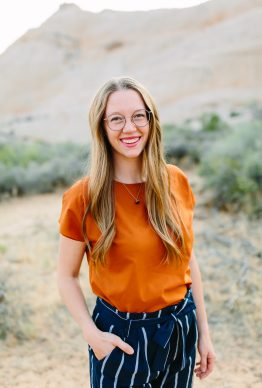
Aubri Robinson
Which woman in the Bible is your personal favorite, and how have you followed her particular example in your life?
AUBRI: The one amazing thing about Dear Divine Daughter: Inspiring Stories of Bible Women is that there is such diversity. We hope that girls relate to stories throughout their lives, so we hope that the women they’re inspired by changes, depending on their needs and circumstances. I’ve noticed that in myself – I feel a connection to and inspired by and drawn to different women at different times in my life.
Growing up, I felt such a connection with the woman with an issue of blood. I was diagnosed with type one diabetes when I was five. I often felt like I could relate to her, living with a chronic illness, and like I was reaching to Christ in a way to help me live with this disease. I gained a lot of strength from her story, and from knowing that Christ saw her even when no one else did.
Now I’m going back to school. I have a degree in business strategy. But about a year and a half ago, I felt inspired to go back to school to study medicine and become a physician, so that I can help other type one diabetic women. Recently, I felt really inspired and buoyed by the story of Huldah who is learned in a time when I’m assuming not a lot of women knew how to read and write. She not only knew how to read and write, but people sought her out as a source of wisdom. That has been inspiring to me as I’ve gone back to school.
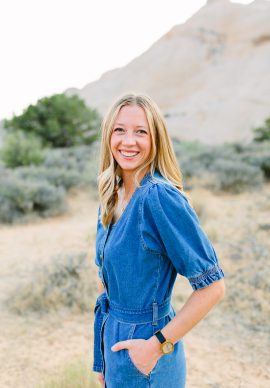
Amber Corkin
AMBER: It’s true. For me, it’s been empowering knowing so many of the stories because of this concept that at different points in our lives, we need different things. One particular Sunday, a few months ago, I was going through a really hard time. I was struggling with a reoccurrence of one of my biggest trials – an anal fissure that has caused me debilitating pain, required surgeries, and physically left my body tense and anxious. I was also dealing with another tear, but a relational one, as I learned that my parents were getting divorced. Dealing with both of these tears at the same time felt overwhelming.
On the pew in church that Sunday, I was mourning my pain, mourning my family’s pain, and just felt helpless in this situation. Suddenly, the story of Mary of Bethany sprang to my mind. This was after our book had come out, and Aubri and I had learned all the stories. I remembered that she was often found kneeling at the feet of Christ. She sat at His feet learning from Him in her own home. When her brother Lazarus died, she fell at Christ’s feet, and they wept together. During Christ’s last week on Earth, she anointed His feet with oil. In that moment, she helped me realize that sometimes just kneeling at the feet of Christ is enough. Even if I couldn’t lift and bless and serve and do all these things that I normally like to do, I could just give myself over to Christ and take a moment to be at His feet. She helped me realize that’s okay. I think it’s important to know the different stories of the women because you never know when you’re going to need their example. At that moment, she was my favorite.
Thank you for sharing those experiences. The title of your book is Dear Divine Daughter and you mentioned that you feel that your children are divine. How have you developed a sense of divine identity for yourself?
AUBRI: We’ve always been women of action, at least I’d like to think so. To me, faith is a very active process, as is patience, as is humility. So many of the Christlike characteristics that we talk about require work and action. Becoming Christlike is a very active process. We know that we are innately and inherently divine. No matter what we do and no matter who we are, we already have divinity within ourselves. I want especially girls to know that they are not only divine but that they have the potential to become even more. We have infinite potential, thanks to our Savior and the Atonement, and the fact that we are daughters and sons of Heavenly Parents: a Heavenly Father and a Heavenly Mother.
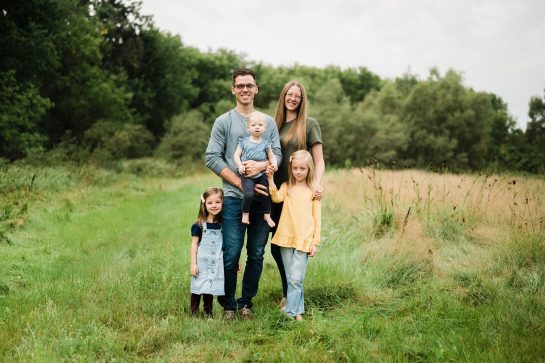
Aubri Robinson with her husband and children
Our book, hopefully, is a way for readers to recognize that no matter what characteristics they have, it’s beautiful. For example, some people think that there are strong and weak characteristics. Being brave like Esther is the ideal, right? But that’s not necessarily the case. The softer characteristics are just as wonderful – being receptive, having faith, having patience, being able to be long-suffering. Each of these can be strong in its own way. We wanted girls to recognize that there is a huge variety of characteristics and they’re all wonderful, and each person has the potential to develop anything you want, to become who you need to be to fulfill your divine assignment on Earth.
Amber and I have each had experiences where we have developed a characteristic that we wanted but felt didn’t come naturally. I am not an inherently patient person but in my patriarchal blessing, I was blessed with patience. It was a very confusing gift for me because I felt like it wasn’t something that came naturally to me. But like I said, I’ve realized that patience is a very active word. It’s not just something you sit back and wait for. My patience is in the form of doing all I can, and in that process, waiting upon the Lord and His timetable.
I feel like my understanding as a divine daughter of God has been a process, and I’m excited that it can continue as I develop divine gifts.
AMBER: For me, there was one moment when I knew without a doubt that I was a daughter of God. It was during my teenage years – I really struggled with self-esteem, with body image, with understanding my identity and who I was. I remember one specific night when everyone else in the house had gone to bed. I was standing in the shower with the water hitting me, and I had the thought, “No one would care if I just disappeared.” It scared me. As soon as I got out of the shower, I went and immersed myself in the scriptures. The decision to choose God and believe, instead of listening to other voice, was a huge blessing for me.
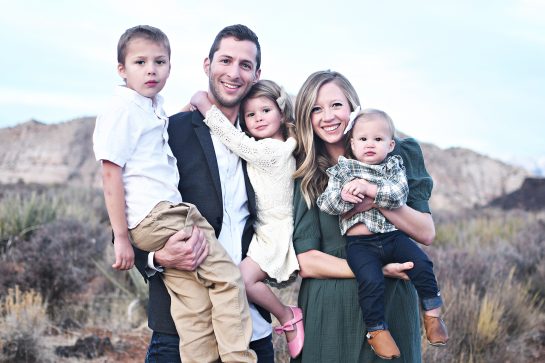
Amber Corkin with her husband and children
Later, in seminary class, my teacher gave us an activity to write a talk in five minutes using just a hymn. I used “Where Can I Turn for Peace,” which was my favorite at the time because I felt like I was going through my own little Gethsemane. The teacher used dice to randomly choose people to share their talks – he rolled for which row and which seat in the row. He got three people and was starting to put his dice away. Then he looked right at me and said, “If I roll your seat, you also have to share,” and I just knew that I was supposed to share. He rolled his dice and sure enough, it was my row and my seat. So I stood up and gave my talk about Christ, and how He can help us through our Gethsemane.
That little miracle was huge to me because it really helped me know that I had a God in heaven who loved me, who was looking out for me. I knew that I was His daughter, which made me divine. From then on, I knew that I was a daughter of God. But like Aubri said, it takes continuous work and effort, because Satan’s really good at whispering lies to us. So it’s up to us to strengthen that testimony. I think my relationship with God ebbs and flows in life, but it’s dependent on what I put in.
You’ve both mentioned Heavenly Parents, and there’s a shift in vocabulary happening right now. How does that connect for both of you?
AUBRI: I think it’s beautiful, I really do. The concept of Heavenly Parents is unique to our church and it’s a beautiful one. It resonates with me. I feel like there’s truth in the concept of a Heavenly Mother. I wonder all the time what She’s like, but writing the book has helped me realize that She could be so many things and be wonderful and inspiring, just like the women in the scriptures. Even if She doesn’t have exactly my characteristics, that doesn’t mean that my relationship with Her can’t be wonderful and amazing. I get a lot of strength and peace from the fact that by developing Christlike characteristics, we are becoming more divine, and therefore more like our Heavenly Mother. So in my effort to get to know Her better, I try to become more like Christ. That feels good and right to me, and I have a lot of room for improvement. So that’s what I try to focus on – less about what I don’t know, and more about who I can become.
AMBER: I think it is so neat that there is a shift of recognizing God the Mother, and including Her in what we talk about, just as it’s important to have the visibility of women in the scriptures. It’s so great that we are starting to highlight Heavenly Mother more because growing up, we didn’t ever think about Her. How cool is it that She’s starting to be a bigger part of the conversation, helping girls realize that there is a feminine divine that they are like, and I think it’s beautiful.
What’s the relationship between your faith and your work?
AMBER: It’s pretty simple that it’s very intertwined. We’re both trying to align ourselves with who God wants us to be and do what He wants us to do.
AUBRI: That reminded me of a talk that John C. Pingree gave in general conference a few years ago. (“I Have a Work for Thee,” October 2017.) It’s the favorite talk I’ve ever read in my whole life, I felt that it was one that was written for me. He talks about our divine assignments. I feel like that concept relates so much to our book in a way, because we have been sent to Earth to do something. Just as our gifts and the situations we’re born into are unique, the divine assignments we’ve been given are unique. And we get to include God and Christ in the process of understanding what those divine assignments are, and then accomplishing the work we’ve been sent to do. That is so empowering that each of us has a role to play and that it’s important.
I love that our book is about empowering girls because I feel like “Strong Girls, Strong World.” Each of us has so much potential to do good and to be good. I love the shift that’s been happening with giving women a voice. It’s exciting to watch and to play a small part in it.
I want to put on the record that I love being a member of the Church of Jesus Christ of Latter-day Saints. It brings me so much purpose and happiness and is grounding. It is just beautiful. It makes my life what it is, whether I’m with my girls at home, or back in school, or working one of my jobs. Faith and what I know – and also what I don’t know, but what I’m trying to become or what I’m trying to learn and understand – makes each of us unique in the best way.
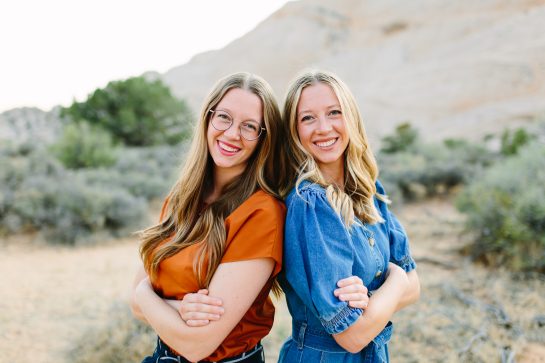
Amber Corkin and Aubri Robinson
I am excited to be offering this book to our daughters and girls around the world and to be an example. When my daughter was six, we were reading the scriptures and she asked me out of the blue, “Mom, how come there aren’t any girls in the scriptures?” That broke my heart, but I turned to her and said, “Wait, just wait.” We were in the middle of writing the book about this. I was so excited to show it to her.
On Mother’s Day in sacrament meeting, the only example from the scriptures that I heard was Nephi and Lehi. It was really sad in a way but was such a validating moment for me, in the fact that the stories of women are already there. They just need to be highlighted and shared and talked about. I’m excited for my girls to grow up hearing these stories, and for other girls around the world to do the same. What better way to show our girls how to reach for their dreams and to become like Christ and to do all we can and fulfill our divine assignments than to show them how. That’s a big expectation. But I know that we can live up to that expectation.
AMBER: Women are so powerful, collectively and individually, and I love that. The more that we can inspire and encourage the next generation to live up to their divine potential, and our generation, the better.
At A Glance
Name: Amber Corkin
Age: 30
Location: St George, UT, USA
Marital History: Married
Children: 3 children (6-year-old boy, 4-year-old girl, and 2-year-old girl)
Occupation: Author
Schools Attended: B.S., Business (Marketing Emphasis)
Languages Spoken At Home: English
Favorite Hymn: Praise to the Lord, the Almighty
Social Media: Instagram @deardivinedaughter @ambercorkin
Name: Aubri Robinson
Age: 30
Location: Rochester, Minnesota
Marital History: Happily Married
Children: 3 strong, smart, and creative daughters (ages 7, 4, and 1)
Occupation: I am currently transitioning from a career in business to medicine. I own a brand development and website design company (Aubri Robinson LLC), work part-time as an ophthalmic technician at Mayo Clinic, am the co-author of Dear Divine Daughter: Inspiring Stories of Bible Women, write abstracts for an OB Anesthesia medical journal, and volunteer as a certified doula at Mayo Clinic’s Family Birth Center.
Education: Bachelor’s degree in Business Management with a strategy emphasis from Brigham Young University Provo; currently taking medical pre-requisite classes at the University of Minnesota Rochester.
Languages Spoken at Home: English (my daughters are in a Spanish immersion daycare, so I’m slowly learning Spanish)
Favorite Hymn: A Child's Prayer (Primary song)
Website: www.deardivinedaughter.com
Interview Produced By: Trina Caudle
